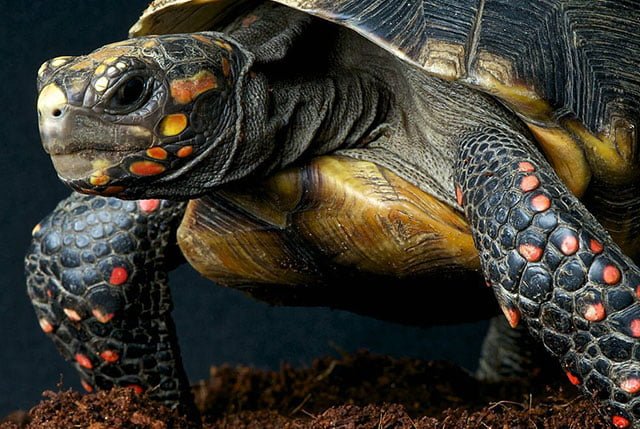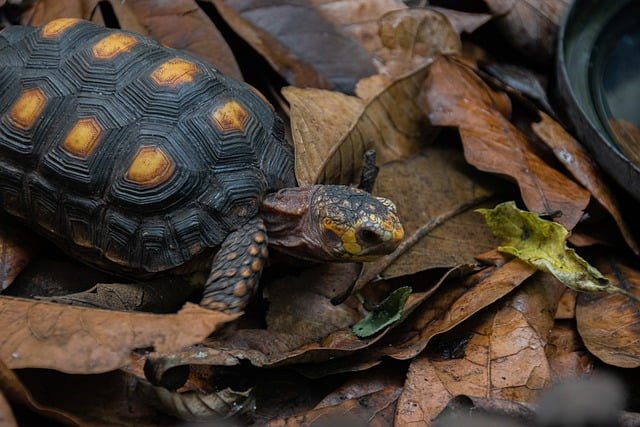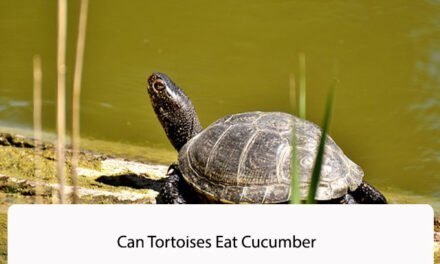Red-footed tortoises are popular pets that require a balanced and nutritious diet to maintain optimal health. As with any pet, it’s important to understand what foods are safe and appropriate to feed them. One common question among red-footed tortoise owners is whether or not they can eat watermelon.
The answer is yes, red-footed tortoises can eat watermelon in moderation. Watermelon is a safe and healthy fruit for tortoises to eat, as it is low in fat and high in vitamins and minerals. However, it should not make up a large portion of their diet, as too much fruit can lead to diarrhea and other digestive issues. It’s important to offer a variety of foods to ensure a balanced diet for your pet tortoise.

Understanding Red Foot Tortoise Diet
When it comes to the diet of a red foot tortoise, it is important to understand that they are omnivores. This means that they eat both plant and animal matter. However, their diet primarily consists of plant matter, with only a small portion of their diet being made up of animal matter.
In the wild, red foot tortoises eat a variety of foods including fruits, vegetables, and flowers. Some of their favorite foods include hibiscus flowers, prickly pear cactus, and various types of berries. They also eat insects, snails, and other small animals when they come across them.
In captivity, it is important to provide a well-balanced diet that mimics their natural diet as closely as possible. This can be achieved by offering a variety of fruits, vegetables, and leafy greens. Some of the best foods to offer include:
- Collard greens
- Mustard greens
- Kale
- Dandelion greens
- Squash
- Carrots
- Sweet potatoes
- Papaya
- Mango
- Berries
It is also important to note that while red foot tortoises can eat watermelon, it should only be offered as an occasional treat. This is because watermelon is high in sugar and can cause digestive issues if fed in excess.
Overall, providing a varied and balanced diet is key to keeping your red foot tortoise healthy and happy.
Watermelons and Red Foot Tortoises
Watermelons are a popular fruit that many people enjoy during the summer months. As tortoise owners, we may wonder if it is safe for our red foot tortoises to eat watermelon. In this section, we will explore whether watermelons are a suitable food for red foot tortoises.
Firstly, it is important to note that watermelons are high in sugar and water content. While red foot tortoises can consume fruits as a part of their diet, it is important to limit the amount of sugar they consume. Too much sugar can cause health issues such as obesity and diabetes. Therefore, watermelon should only be given to red foot tortoises in moderation.
Secondly, watermelons are also high in potassium and vitamin C. While these nutrients are beneficial for red foot tortoises, it is important to note that they should not be the sole source of these nutrients in their diet. Red foot tortoises require a balanced diet that includes a variety of fruits, vegetables, and proteins.
Lastly, when feeding watermelon to red foot tortoises, it is important to remove the seeds and rind. The seeds can be a choking hazard and the rind is difficult for them to digest. It is best to cut the watermelon into small pieces and feed it as a treat.
In conclusion, red foot tortoises can eat watermelon in moderation as a part of a balanced diet. However, it is important to remove the seeds and rind and not rely on watermelon as the sole source of nutrients.
Health Benefits of Watermelon
Watermelon is a delicious fruit that is enjoyed by many. It is also a great source of nutrients that can benefit our health. In this section, we will discuss some of the health benefits of watermelon.
Rich in Nutrients
Watermelon is a low-calorie fruit that is rich in nutrients. It contains high amounts of vitamins A and C, as well as potassium and magnesium. It is also a good source of dietary fiber.
Hydration
Watermelon is made up of about 92% water, making it a great fruit to help keep us hydrated. Staying hydrated is important for our overall health and can help prevent dehydration.
Antioxidants
Watermelon contains antioxidants such as lycopene and beta-carotene. These antioxidants can help protect our cells from damage caused by free radicals. This can help reduce the risk of chronic diseases such as cancer and heart disease.
Anti-inflammatory
Watermelon also contains anti-inflammatory compounds such as cucurbitacin E and flavonoids. These compounds can help reduce inflammation in the body, which can help prevent chronic diseases.
In conclusion, watermelon is a delicious fruit that is also packed with nutrients that can benefit our health. Its high water content, antioxidants, and anti-inflammatory compounds make it a great addition to a healthy diet.

Possible Risks of Watermelon
While watermelon is generally safe for red foot tortoises to eat, there are a few potential risks to be aware of.
Firstly, watermelon is high in sugar, which can cause digestive issues if consumed in excess. This is especially true for tortoises that are overweight or have a history of digestive problems. It’s important to feed watermelon in moderation and as part of a balanced diet.
Secondly, the seeds and rind of watermelon can be difficult for tortoises to digest and may cause blockages in the digestive tract. It’s important to remove all seeds and the tough outer rind before feeding watermelon to your tortoise.
Lastly, some watermelons may be treated with pesticides or other chemicals that can be harmful to your tortoise. It’s important to wash the watermelon thoroughly before feeding it to your tortoise or consider purchasing organic watermelons.
Overall, while watermelon can be a tasty treat for your red foot tortoise, it’s important to be aware of these potential risks and feed it in moderation as part of a balanced diet.
Feeding Guidelines
When it comes to feeding red-footed tortoises, it is essential to ensure that they receive a well-balanced diet. Red-footed tortoises are omnivorous, meaning they eat both plants and animals. In the wild, they feed on a variety of fruits, vegetables, flowers, and insects. As a responsible pet owner, it is our responsibility to provide them with a similar diet in captivity.
When feeding red-footed tortoises, it is important to follow some guidelines to ensure that they receive a balanced diet. Here are some feeding guidelines that you should follow:
1. Variety is key
Red-footed tortoises require a varied diet to remain healthy. Therefore, it is essential to provide them with a variety of fruits, vegetables, and protein sources. Some of the foods that you can feed your red-footed tortoise include:
- Fruits: Apples, bananas, berries, mangoes, papayas, and watermelon.
- Vegetables: Carrots, collard greens, kale, squash, and sweet potatoes.
- Proteins: Crickets, mealworms, and boiled eggs.
2. Avoid feeding high-fat foods
Red-footed tortoises are prone to obesity, which can lead to health problems. Therefore, it is essential to avoid feeding them high-fat foods such as cheese, nuts, and seeds.
3. Provide calcium-rich foods
Red-footed tortoises require calcium to maintain healthy shells and bones. Therefore, it is important to provide them with calcium-rich foods such as kale, collard greens, and calcium supplements.
4. Offer fresh water
Red-footed tortoises require access to fresh water at all times. Therefore, it is essential to provide them with a shallow water dish that is changed daily.
In conclusion, feeding red-footed tortoises a well-balanced diet is essential to their health and well-being. By following these feeding guidelines, you can ensure that your red-footed tortoise receives a nutritious and balanced diet.
Alternatives to Watermelon
If you’re looking for other fruits to feed your red foot tortoise, there are several options that are safe and nutritious. Here are some alternatives to watermelon:
Papaya
Papaya is a great choice for red foot tortoises because it is high in fiber, vitamins, and minerals. It’s also low in calories, which makes it a good option if your tortoise needs to lose weight. Make sure to remove the seeds before feeding it to your tortoise.
Mango
Mango is another fruit that red foot tortoises can enjoy. It’s high in vitamin C, which can help boost your tortoise’s immune system. Mango is also a good source of fiber and antioxidants. Make sure to remove the skin and pit before feeding it to your tortoise.
Berries
Berries such as strawberries, raspberries, and blueberries are safe for red foot tortoises to eat. They are high in antioxidants and vitamins, and they are low in calories. Make sure to wash the berries thoroughly before feeding them to your tortoise.
Squash
Squash is a good source of fiber and vitamins, and it’s low in calories. Red foot tortoises can eat both summer and winter squash, but make sure to remove the seeds and skin before feeding it to your tortoise.
Leafy Greens
Leafy greens such as kale, collard greens, and dandelion greens are an important part of a red foot tortoise’s diet. They are high in vitamins and minerals, and they provide fiber to help keep your tortoise’s digestive system healthy. Make sure to wash the greens thoroughly before feeding them to your tortoise.
Overall, there are many safe and nutritious fruits and vegetables that red foot tortoises can eat besides watermelon. Make sure to vary your tortoise’s diet and provide a balanced mix of fruits, vegetables, and leafy greens to ensure that your tortoise gets all the nutrients it needs.
Conclusion
In conclusion, after researching and analyzing the nutritional value of watermelon and the dietary requirements of red-footed tortoises, we can confidently say that watermelon can be a healthy and safe addition to their diet.
While watermelon is not a primary food source for red-footed tortoises, it can provide them with essential vitamins and minerals such as vitamin C, potassium, and beta-carotene. It can also help keep them hydrated, especially during hot summer months.
However, it is important to note that watermelon should not replace their regular diet of leafy greens, vegetables, and fruits. It should only be given as an occasional treat in moderation.
Additionally, it is crucial to remove any seeds and rind before feeding watermelon to red-footed tortoises. The seeds can cause digestive issues and the rind can be difficult for them to chew and swallow.
Overall, incorporating watermelon into a red-footed tortoise’s diet can provide some nutritional benefits, but it should be done in moderation and with caution. As always, consult with a veterinarian or reptile specialist before making any significant changes to your pet’s diet.

Frequently Asked Questions
What kind of fruit can a Redfoot Tortoise eat?
Redfoot Tortoises can eat a variety of fruits, but it’s important to keep in mind that fruits should only be a small part of their diet. Some fruits that Redfoot Tortoises can eat include strawberries, raspberries, blueberries, and mangoes. It’s important to avoid feeding them fruits that are high in sugar, such as grapes and bananas, as these can lead to health problems.
What is a Redfoot Tortoise favorite food?
Redfoot Tortoises enjoy a variety of foods, but their favorite food is typically leafy greens. Some of their favorite greens include kale, collard greens, and dandelion greens. They also enjoy eating vegetables such as carrots, squash, and sweet potatoes.
Can tortoises eat honeydew melon?
Yes, Redfoot Tortoises can eat honeydew melon, but it should only be given to them in moderation. Honeydew melon is high in sugar, so it’s important to limit their intake to prevent health problems.
Can red footed tortoises eat cantaloupe?
Yes, Redfoot Tortoises can eat cantaloupe, but like with honeydew melon, it should only be given to them in moderation. Cantaloupe is high in sugar, so it’s important to limit their intake to prevent health problems.
Can tortoises eat watermelon seeds?
Redfoot Tortoises can eat watermelon, but it’s important to remove the seeds before feeding it to them. Watermelon seeds can cause digestive problems, so it’s best to avoid feeding them to your tortoise.
What veggies can red footed tortoises eat?
Redfoot Tortoises can eat a variety of vegetables, including leafy greens, carrots, squash, and sweet potatoes. It’s important to offer them a variety of vegetables to ensure they are getting all the nutrients they need.





